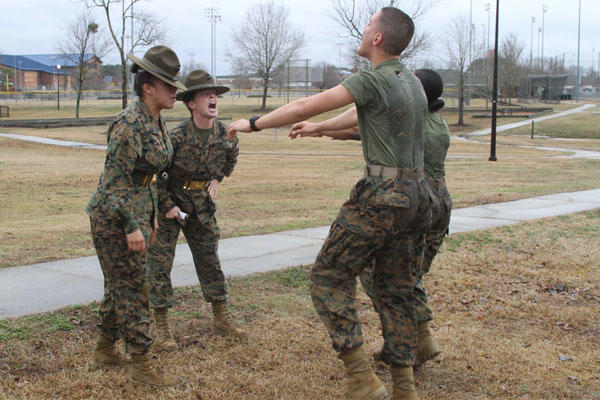Male and female recruits in the U.S. Marine Corps will continue training in gender-specific units when they arrive at boot camp, Navy Secretary Ray Mabus told Marines at Camp Pendleton, California on Tuesday.
The secretary traveled to the West Coast base as part of a series of stops he has made to discuss efforts to open previously closed infantry and ground combat units to women, a move for which he has been an outspoken advocate.
While Mabus has occasionally clashed with Marine Corps leadership over issues related to the topic, he told the Marines he had made a concession to top brass over the boot camp issue.
Mabus initially sent a memo to Marine Corps Commandant Gen. Robert Neller ordering him to integrate boot camp at Parris Island, South Carolina, where men and women have always trained in separate battalions. But the Navy secretary walked back his stance, he said, when Neller and Sergeant Major of the Marine Corps Ronald Green met with him and advocated for keeping a status quo in which the genders did not train together until later in the pipeline.
"They made pretty good points," he said Tuesday.
Mabus did not offer additional details about the meeting. But Marine officials have previously defended single-sex training units at boot camp as limiting distractions, providing recruits with a safe environment to learn, and offering same-gender Marine role models with whom to identify.
While the Marine Corps would continue to move in the direction of total training integration, Mabus said, it would not do so all at once.
"We're not going to do it in one day ... we're not going to disrupt training," he said.
Mabus also appeared to take a softer stance on a study the Marines conducted last year to determine how women would fare in ground combat units.
When officials announced last fall that data showed teams and squads with female members were slower, less accurate, and more injury-prone, Mabus publicly denounced the findings. In an interview with NPR, he claimed that the Marine officials behind the study had "almost presupposed" a negative outcome, and that "there should have been a higher bar" for female study volunteers to meet.
But on Tuesday, he focused on the positive.
"Everyone there [in the study was a volunteer and they did great work. I gave a [Navy commendation medal] to anyone who went through that," he said. "What I disagreed with is, once the test was done, the conclusions weren't based on individuals. The conclusions were based on averages. The Marines have never been about averages, ever."
Mabus also reiterated, multiple times, that he has no plans to drop training standards in order to make it easier for female infantry troops to succeed.
"You do not lower standards, ever," he said. "Standards may be changed as circumstances in the world change. But they'll be changed for everybody, not any one group."
Mabus cited a tour he recently completed of Marine Corps training schools, including the Infantry Officers Course at Quantico, Virginia. While 29 female officers have attempted the grueling course, none has made it through.
"One of the questions I got at IOC was, 'okay, five years from now, no woman had made it through IOC. What happens?'" Mabus said. "My response was, 'no woman made it through IOC. Standards aren't going to change.'"
-- Hope Hodge Seck can be reached at hope.seck@military.com. Follow her on Twitter at @HopeSeck.





























